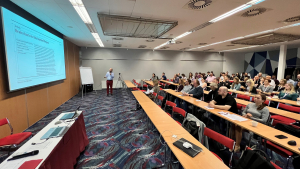ICRC-led healthy ageing research counts its successes
Preventing diabetes or understanding the causes of Alzheimer’s disease – these are also topics supported by the Molecular, Cellular and Clinical Approach to Healthy Ageing (ENOCH) project, whose investigators met in Brno at the end of September. More than a hundred representatives from five top Moravian research centres evaluated the achievements of ENOCH so far. The project has succeeded in creating a unique space for mutual cooperation of experts in the field and the application of the qualities of each of the participating workplaces. The knowledge gained is a further step on the road to active and healthy ageing.
The Continental Hotel in Brno hosted the ENOCH (MolEcular, cellular and cliNical apprOaCH to healthy aging) project meeting on 29-30 September 2022. Led by the International Clinical Research Centre (ICRC) in Brno, the platform includes partners from Palacký University in Olomouc, Masaryk Cancer Institute, University of Ostrava and Olomouc University Hospital. The project was born in 2018 with the idea of coordinating research centres dedicated to topics related to population ageing.
As Professor Irena Rektorová, Head of the ICRC, reminded us in her introduction, “The goal is not immortal life, but a healthy old age, i.e. to age actively and healthily.” The development of new preventive, diagnostic and therapeutic solutions for age-related disorders should contribute to this. “ENOCH purposefully unifies current research on healthy ageing and makes full use of its potential to share know-how, experts and resources across the region. It is the networking of different institutions that is crucial to ENOCH’s contribution, as each of the researchers has unique practices and expertise to offer the field”, adds project coordinator, Dr. Gorazd B. Stokin of the ICRC.
Specifically, the research teams are studying, for example, dementia, cancer, chronic inflammation and heart disease. These disorders affect a large part of the population in advanced age and therefore affect not only the elderly but also their families. The consequences are also reflected in the healthcare system and the budget for health and social services.
The results are coming out both in the field of basic research, i.e. in laboratories, and in medical practice. For example, the Kardiovize team at the ICRC, with the support of the ENOCH project, has designed a diabetes prevention programme. Based on measurements of the health status of the local population, the researchers have put together a set of effective measures in the form of a preventive lifestyle programme, which takes place regularly at the St. Anne’s University Hospital in Brno and offers participants training in a lifestyle that suits them while supporting their long-term health.
After two years of metal restrictions, the annual meeting of the ENOCH project was once again held in full attendance. It offered a discussion on the progress of the project implementation, both in terms of the fulfilment of the binding indicators and benchmarks, and in particular on the research activities carried out by the different teams. The Steering Committee also met and positively evaluated the performance and results of the project so far and also focused on the commitments and plans for its subsequent sustainability. The programme also offered presentations by three guests. Dr. Robert Zorec from the University of Ljubljana addressed the topic “Noradrenergic hypotheses of cognitive decline and astroglia”. Dr. GIampiero Leanza from the University of Catania followed with an online presentation on “Noradrenaline and the regulation of spatial memory”. The trio was rounded off by Dr Kenneth Moya from the Department of Biology, École Normale Supérieure, Paris with “Neuroprotective action of the homeoprotein Engrailed 1 and motoneuron physiology”.
The ENOCH project (Molecular, Cellular and Clinical Approach to Healthy Ageing, CZ.02.1.01/0.0/0.0/16_019/0000868) is funded by the European Regional Development Fund. The implementation phase of the project ends in June 2023, when a five-year sustainability period will follow.



